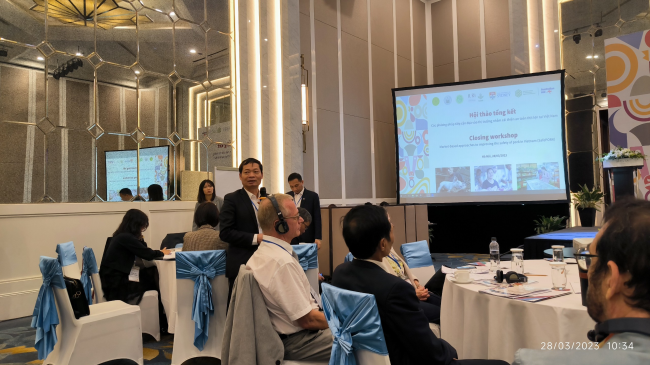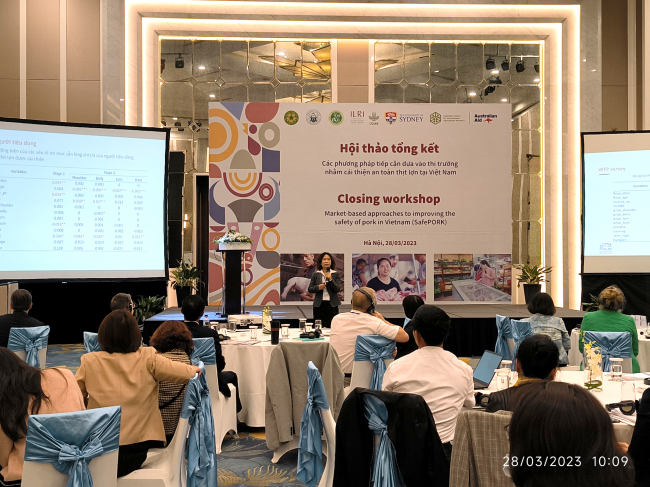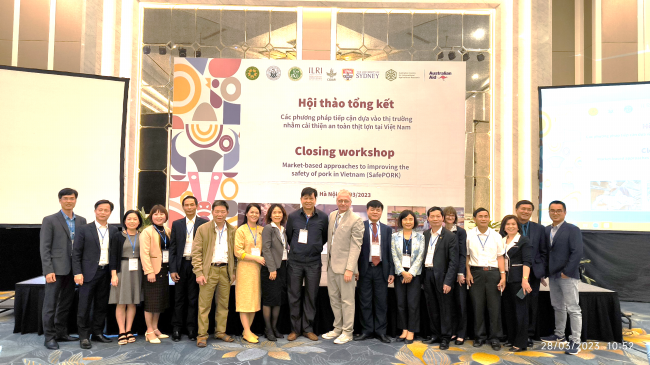The project “Market-based approaches to improving the safety of pork in Vietnam” (SafePORK) was carried out from 2017 to 2023 with a number of activities in five provinces (Hanoi, Hung Yen, Nghe An, Hoa Binh and Thai Nguyen). The International Livestock Research Institute (ILRI) and three partners in Vietnam implemented the project. Vietnam National University of Agriculture (VNUA) (Department of Quantitative analysis/Research Group of Economic linkages and Market Development) was one of main partners of the project.
On 28th March 2023, ILRI and the partners, including Vietnam National University of Agriculture (VNUA), the Hanoi University of Public Health (HUPH), National Research Institute of Animal Science (NIAS), and the University of Sydney, organized the project’s closing workshop. There were representatives of many international and national organizations attending the workshop such as the Australian Center for International Agricultural Research (ACIAR), Thai Nguyen University of Agriculture and Forestry (TUAF), Department of Food Safety and state management agencies and pork value chain actors participating in the project in Hanoi, Hung Yen, Nghe An, Thai Nguyen and Hoa Binh. In addition, scientists and researchers from different organizations and other agencies in Hanoi also participated the workshop.
One of the findings of the SafePORK was that it sought to reduce the burden of foodborne diseases in informal, emerging and niche markets. Food safety was improved through simple and market-based approaches and small interventions. In the workshop, the research team presented the project’s results and interventions to improve food hygiene practices in the smallholder pork value chain. For slaughterhouse, the interventions included separating dirty and clean area, slaughtering pigs on stainless steel/Inox grids, and regularly washing hands and slaughtering tools. For retailing places, the interventions included wearing an apron of retailers, cleaning meat counter surfaces, separating offal and pork, raw and cooked meat, and frequently washing hands and tools during the retailing time.
Those interventions were assessed as simple, low-cost and effective in reducing the level of pork contamination in traditional markets. These interventions could be scale-out in the future.
On behalf of the research team of VNUA, Assoc. Prof. Dr. Pham Van Hung presented research findings on “Consumer’s knowledge, attitudes, and practices (KAP) on food safety in pork value chains in Vietnam”. The results showed that there had been a slightly positive trend in pork value chain in Vietnam towards safer food. However, changes in consumers’ KAP for safe pork were slow and there were misperceptions about food safety (FS), especially under-estimation of the threats on human health from biological hazards, and over-estimation of the risks from chemical hazards. Several implications of upgrading pork VC were drawn, including FS risk communication to consumers should be strengthened via different official channels.
    |
 |
| Assoc. Prof. Dr. Pham Van Hung presenting at the workshop |
Assoc. Prof. Dr. Nguyen Thi Duong Nga presented research findings on “Consumers’ willingness to pay for upgraded fresh pork”. The study showed that consumers were willing to pay for better quality pork, which was either trusted “safer” in upgraded shops, or produced under specific protocols. Household demographic characteristics were found to have influences on both consumers’ decision to buy upgraded pork and price premium paid. Training was found to positively affect consumers’ price premium that they were willing to pay for certified pork. The findings indicated the potential economic benefit of upgrading pork shops, which would be an important driver to motivate sellers to improve food safety. Education/training on food safety should be strengthened while upgrading pork value chain in terms of both product and food safety. It was challenging for educating consumers on safety to change their behavior. Hence, appropriate communication strategy was required to change the knowledge and practices of consumers.
    |
 |
| Assoc. Prof. Dr. Nguyen Thi Duong Nga presenting at the workshop |
At the workshop, Dr. Shirley Tarawali, the Acting General Director of ILRI, concluded that “SafePORK's studies and interventions have made a significant contribution to improving pork safety in Vietnam; at the same time supporting many livelihoods for people. Valuable lessons from this project will help move towards a safer food system for Vietnam and beyond”. Other scientists have also expressed their impression of the results of the project.
    |
 |
| The project team and local partners from Hung Yen and Nghe An |
Ninh Xuan Trung, Nguyen Thi Thu Huyen,
Economics Linkages and Market Development